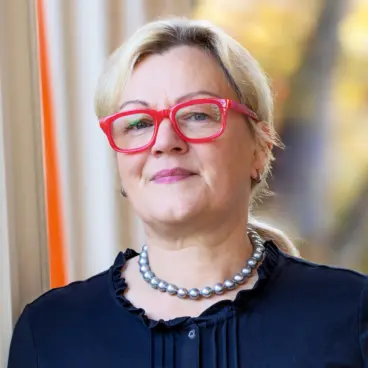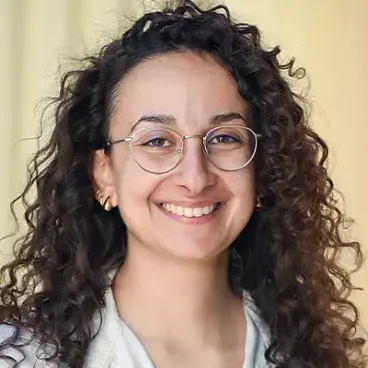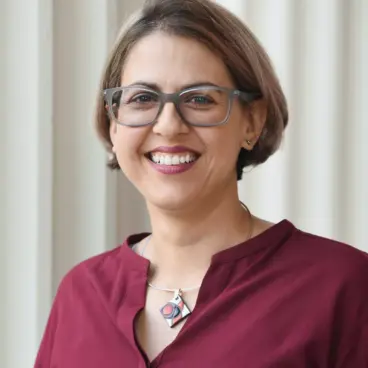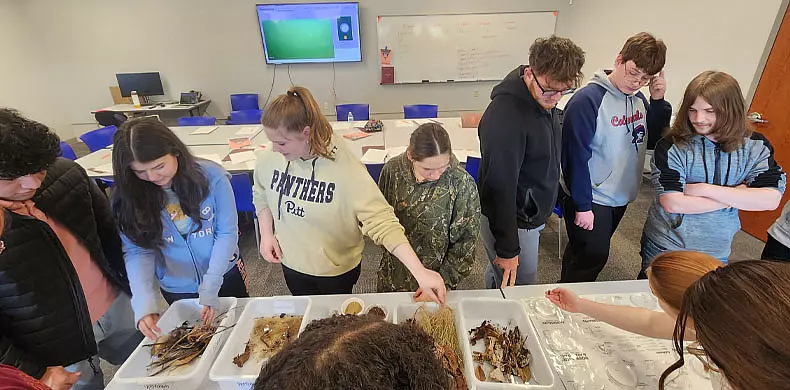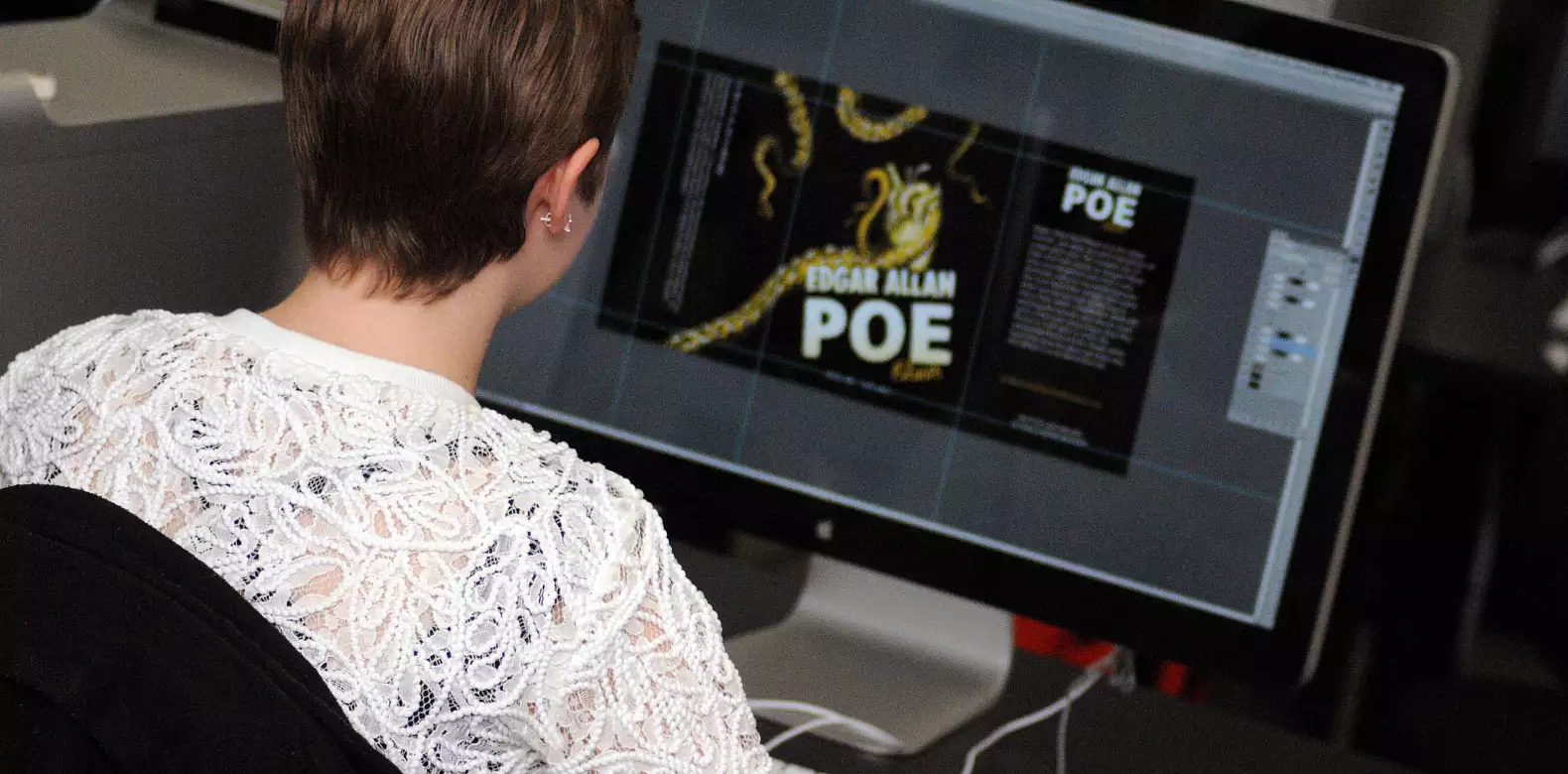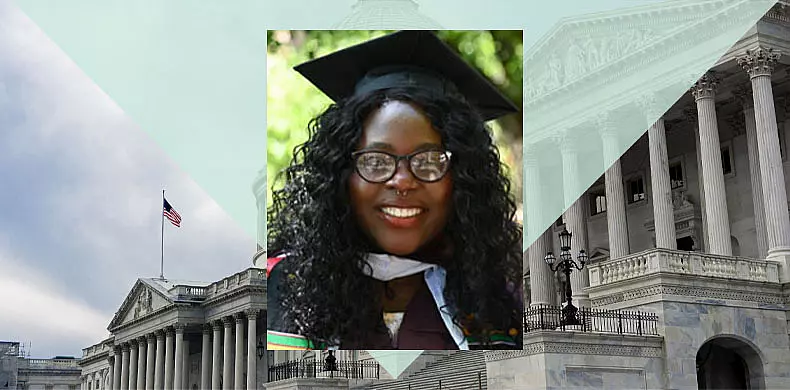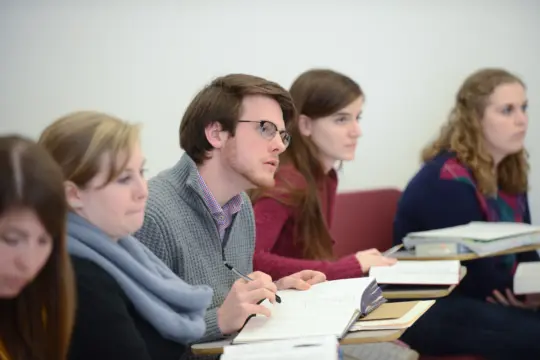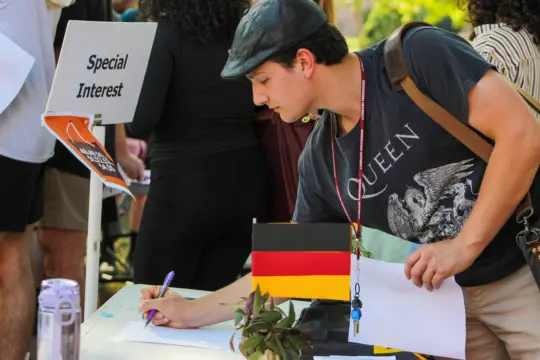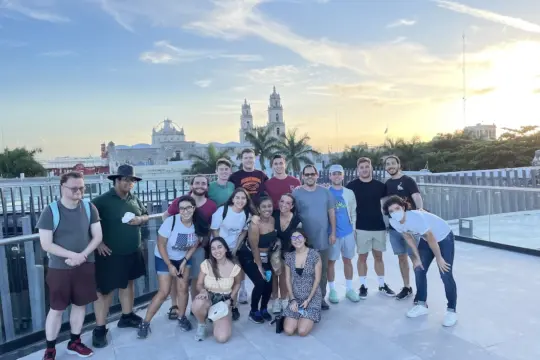French Studies
A major or double-major in French helps you navigate cultures, industries, arts, and governments all over the world.

French Studies Degree
French Studies can take you around the world
Did you know that French is a fast-growing language spoken in 40 different countries and territories, and that 29 nations name French as an official language? It is also taught around the world and is an official language of international organizations, including the United Nations, the World Trade Organization, the Olympics and UNESCO. That means that adding French to your skill set can open doors for your career internationally.
A major or double-major in French helps you navigate cultures, industries, arts and governments all over the world. With our focus on real-life projects, you may work on translating personal letters from the World Wars, creating videos focusing on aspects of the cultures in Francophone areas of the world, or collaborating with a music history class on a recital of French Renaissance songs. Spend a semester studying in Strasbourg or Aix-en-Provence, or a summer studying in France or Canada. Add your voice and perspective to the Weekly Conversation hour or Francophone film series. Go even deeper by adding one of our interdisciplinary minors like applied linguistics, international studies or African studies to help prepare you for wherever your career path takes you. After graduation, many French majors spend a year in France, teaching English conversation in the public schools through the TAPIF program.
When you pair language studies with another major, you will integrate your perspective on each area of specialization, increasing the directions your career can take. With French studies, you gain skills, knowledge, cultural experience, and critical tools that make you a compelling prospect for any graduate school or employer.
Transformative International Experiences
Through immersive coursework and enriching study-abroad opportunities, Susquehanna’s French Studies program prepares students for impactful roles abroad.
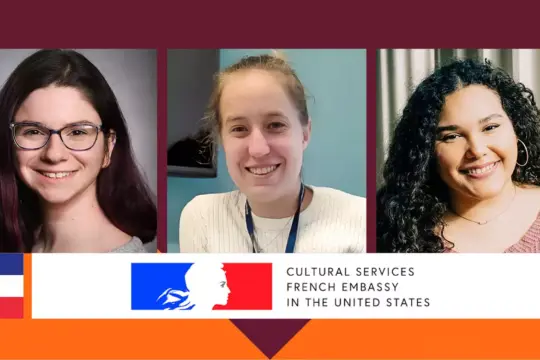
SUSQUEHANNA By the Numbers
More Than Metrics
100%
of majors study abroad for a semester, living with a French-speaking host family
90%
of graduating seniors applying to TAPIF to teach English conversation in French public schools have been accepted.
95%
of majors combine French studies with a second major
French studies majors selected for prestigious program
Thanks to Susquehanna’s immersive, multidisciplinary approach to language education, you will be well prepared for postgraduate opportunities in the Francophone world. Meet several alumni who were accepted to the highly selective teaching assistant program in France.

Explore Your Studies
Program Resources
Arabic Studies
Continuation of ARBC-101. An introduction to speaking, reading, listening and writing in Arabic. Also explores aspects of Arab culture. Prerequisite: ARBC-101 or equivalent department-approved proficiency. CC: Foreign Language.
Chinese Studies
Introduces students to short conversations in Standard (Mandarin) Chinese while laying the foundations for further studies of the language. Includes standard pronunciation, basic vocabulary and writing simple statements. Explores the systems of language and culture of the Chinese people. 4 SH.
Continuation of CHNS-101. Introduces students to short conversations in Standard (Mandarin) Chinese, while laying foundations for further studies of the language. Includes standard pronunciation, basic vocabulary and writing simple statements. Explores the systems of language and culture of the Chinese people. 4 SH. Prerequisite: CHNS-101 or equivalent department-approved proficiency. CC: Foreign Language.
Review and expansion of elementary-level skills to intermediate level. Focus on developing skills needed to improve: listening, speaking, reading and writing. Topics include culture and civilization with emphasis on current issues, comparisons to our own cultures and interdisciplinary perspectives. Prerequisite: CHNS-102 or equivalent department-approved proficiency. 4 SH.
This is the second part of Intermediate Chinese. It aims to provide students with an authentic and effective language environment and help create a fun Chinese learning experience. Students will continue to develop their skills in the Chinese language by mastering approximately 150 new characters, more complicated expressions and more advanced grammar. By completing this course, students should be able to communicate with others in the above-mentioned daily life situations, read materials of moderate difficulty and write simple compositions related to the topics. Students will also achieve a better understanding of Chinese culture. Prerequisite: CHNS-201 or equivalent department-approved proficiency. 4 SH.
French Studies
Intended for both students who are new to the language and students with limited previous experience in the language who have placed into the first-semester level. Focuses on acquisition of core vocabulary and structures useful for completing conversational and writing tasks associated with daily life. Also, development of strategies for reading short, authentic texts in the target language. Includes study of cultural topics. 4 SH. Prerequisite: placement at FRNC-101 is required.
Continuation of Beginning French I with emphasis on development and application of speaking, listening, reading and writing skills. Individual and group projects center on cultural dimensions of France and the French-speaking world. Prerequisite: FRNC-101, placement by examination, or equivalent department-approved proficiency. 4 SH. Prerequisite: completion of FRNC-101 or placement at FRNC-102. CC: Foreign Language.
This project-based course will focus on study of cultural issues in contemporary France, along with language study meant to increase students’ proficiency while supporting course discussion and work on projects. The individual and group projects completed in this course will encourage students to bring their own academic and personal interests to bear on the cultural issues under study. Because issues and projects will vary from year to year, FRNC-205 may be taken twice for full credit. FRNC-205 and FRNC-208 may be taken in any order. Prerequisites: FRNC-102. 4 SH.
This project-based course will focus on study of cultural issues in the larger French-speaking world (mostly outside of France, but sometimes addressing issues that arise at the intersection of France and other French-speaking areas), along with language study meant to increase students’ proficiency while supporting course discussion and work on projects. The individual and group projects completed in this course will encourage students to bring their own academic and personal interests to bear on the cultural issues under study. Because issues and projects will vary from year to year, FRNC-208 may be taken twice for full credit. FRNC-205 and FRNC-208 may be taken in any order. Prerequisites: FRNC-102 or equivalent placement. 4 SH. CC: Diversity Intensive.
The focus of this intermediate/advanced course is to develop oral skills in French: develop vocabulary and strategies for engaging actively in a variety of types of conversational interactions, from obtaining information to expressing opinions, to elaborating and defending a position, to explaining ideas. Focus will be on developing the ability to speak spontaneously and at length, and to speak before a group. The course is structured around projects emphasizing various oral skills, including pronunciation and intonation, one of which focuses on organizing and running a French-language outreach event. Prerequisites: 8 credits at the 200-level. Students with equivalent high school or other experience may enroll with instructor approval. 4 SH.
The focus of this course is to practice various genres of writing and to develop skills the art of individual and/or collaborative translation. The course is structured around a central project of translating real-world texts on a cultural topic or theme, and the translation work will involve gaining some understanding of that topic or theme. Writing in various genres will relate to this topic or theme through fact and fiction. Language structures studied in this course will support work on these projects. Prerequisites: 8 SH at the 200-level instructor approval. This course may be taken twice for full credit. CC: Interdisciplinary. 4 SH.
DO NOT USE FOR ACADEMIC PLANNING OR COURSE REGISTRATION. The focus of this course is to practice various genres of writing and to develop skills the art of individual and/or collaborative translation. The course is structured around a central project of translating real-world texts on a cultural topic or theme, and the translation work will involve gaining some understanding of that topic or theme. Writing in various genres will relate to this topic or theme through fact and fiction. Language structures studied in this course will support work on these projects.
Topics vary each semester. Students may take more than one 300-level topics course. Critical study of particular cultural and literary themes and topics related to France and the French-speaking world. Approach and projects will vary with course topics. Prerequisite: FRNC-301 or FRNC-302 or department-approved proficiency. 2-4 SH.
Topics vary each semester. Students may take more than one 460 seminar. These seminars explore selected topics in depth and from the perspective of more than one discipline. Includes discussion of theory and research methods. A research project is a central component of this course. Prerequisite: sophomore standing and completion of a semester studying abroad. 4 SH. Capstone. CC: Interdisciplinary, Writing Intensive.
Supervised employment in a modern language environment. Prerequisite: Department permission. 4-8 SH.
Prerequisites: 48 semester hours, a cumulative 3.00 or higher GPA, approval of supervising professor and course area department head. 1-4 SH.
Non-credit. Required for all majoring students. Individually scheduled. Taken only in the student’s final semester prior to graduation. Graded on a satisfactory/unsatisfactory basis.
German Studies
Intended both for students with previous experience in the language but who have not placed above the first-semester level and for students new to the language. Focuses on conversations to acquire a useful core vocabulary, reading graded prose and writing brief sentences. Explores the systems of language, culture and civilization of German-speaking peoples. 4 SH. Prerequisite: placement at GERM-101.
A continuation of GERM-101. Focuses on conversations to acquire a useful core vocabulary, reading graded prose and writing brief sentences. Explores the systems of language, culture and civilization of German-speaking peoples. Prerequisite: GERM-101, placement by examination, or department-approved proficiency. 4 SH. CC: Foreign Language.
Review and expansion of elementary-level skills to intermediate level. Focus on developing skills needed to improve: listening, speaking, reading and writing. Topics include culture and civilization with emphasis on current issues, comparisons to own cultures and interdisciplinary perspectives. Prerequisite: GERM-102, placement by examination, or equivalent department-approved placement. 4 SH.
Extensive review and expansion of elementary-level skills. Focus on improving all skills: listening, speaking, reading and writing. Also includes culture and civilization. Prerequisite: GERM-201, placement by examination, or department-approved proficiency. 4 SH. CC: Diversity Intensive.
Language skill development, emphasizing formal speaking and short essay writing. Includes cultural and/or literary materials. Prerequisite: GERM-202 or equivalent departmental-approved proficiency. 4 SH.
Focus on written German (reading and writing), including a systematic review of principal grammatical structures. Development of critical thought and expansion of vocabulary through analysis of original German, Austrian and Swiss texts in various genres and media (including literary, journalistic and scientific prose, features and documentaries). Enhancement of German composition skills. Designed for students with a functional command of the German language and an understanding of its basic grammatical structures. Prerequisites: GERM 202 or equivalent department-approved proficiency. 4 SH.
Critical study of particular topics and forms of Austrian, German and Swiss literature, culture and film. Themes and genres will vary according to the interest and expertise of the instructor. Lectures, discussions and readings in German. Prerequisites: GERM 301 or GERM 302, or equivalent, department-approved proficiency. 4 SH.
Explores selected topics in depth. Research paper required. Prerequisite: A 300-level German course or department-approved proficiency. 4 SH. Capstone. CC: Writing Intensive.
Supervised employment in an appropriate modern language environment. Prerequisite: Department permission. 4-8 SH.
Prerequisites: 48 semester hours, a cumulative 3.00 or higher GPA, approval of supervising professor and course area department head. 1-4 SH. Counts toward the major or minor.
Non-credit. Required for all majoring students. Individually scheduled. Taken only in the student’s final semester prior to graduation. Graded on a satisfactory/unsatisfactory basis.
Italian Studies
Intended both for students with previous experience in the language but who have not placed above the first-semester level, and for students new to the language. Focuses on the acquisition of core vocabulary and structures necessary for carrying out short conversations, reading graded prose and writing brief sentences associated with daily life. Also explores aspects of Italian civilization and culture. Prerequisite: a placement of ITAL-101 is required. 4 SH.
Focuses on the acquisition of core vocabulary and structures necessary for carrying out short conversations, reading graded prose and writing brief sentences associated with daily life. Also explores aspects of Italian civilization and culture. Prerequisite: ITAL-101 or equivalent department-approved placement. 4 SH. CC: Foreign Language.
This intermediate-level course involves the exploration of a variety of themes related to Italian culture and civilization (e.g. immigration, family, politics, etc.). The approach used is theme-driven content-based instruction. It is designed to increase your language proficiency in Italian through the study of content focused on themes of particular importance in Italian culture and civilization. The course may be repeated for credit as the theme varies from year to year. ITAL-2THM and ITAL-2TPC may be taken in any order. Prerequisites: ITAL-102 or equivalent department-approved proficiency. 4 SH
This intermediate-level course involves the exploration of a specific topic related to Italian culture and civilization (e.g. Italian regional culture; Italian history through film, etc.). The approach used is topic-driven content-based instruction. It is designed to increase your language proficiency in Italian through the study of content focused on a broad topic of particular importance in Italian culture and civilization. The course may be repeated for credit as the topic varies from year to year. ITAL-2TPC and ITAL-2THM may be taken in any order. Prerequisites: ITAL-102 or equivalent department-approved proficiency. 4 SH
This advanced-level course involves the exploration of a variety of themes related to Italian culture and civilization (e.g. immigration, family, politics, etc.). The approach used is theme-driven content-based instruction. It is designed to continue to increase your language proficiency in Italian through the study of content focused on themes of particular importance in Italian culture and civilization. The course may be repeated for credit as the theme varies from year to year. ITAL-3THM and ITAL-3TPC may be taken in any order. Prerequisites: Two intermediate-level Italian courses or equivalent department-approved proficiency. 4 SH
This advanced-level course involves the exploration of a variety of themes related to Italian culture and civilization (e.g. immigration, family, politics, etc.). The approach used is theme-driven content-based instruction. It is designed to continue to increase your language proficiency in Italian through the study of content focused on themes of particular importance in Italian culture and civilization. The course may be repeated for credit as the theme varies from year to year. ITAL-3THM and ITAL-3TPC may be taken in any order. Prerequisites: Two intermediate-level Italian courses or equivalent department-approved proficiency. 4 SH
Prerequisites: 48 semester hours, a cumulative 3.00 or higher GPA, and approval of supervising instructor and course area department head. 1-4 SH. Counts toward the major or minor.
Spanish Studies
Intended both for students with previous experience in the language who have not been placed above the first-semester level and for students new to the language. Focuses on the acquisition of core vocabulary and grammatical structures necessary for basic communication so students can carry out brief conversations, write about daily life and explore short culture-based readings in Spanish. Placement at SPAN-101 (or 103) is required. 4 SH.
Continuation of SPAN-101. Focuses on the continued acquisition of core vocabulary and grammatical structures necessary for basic communication so students can further develop their skills for brief conversations, writing about daily life and exploring short culture-based readings in Spanish. Prerequisite: SPAN-101 or equivalent department-approved placement. 4 SH. CC: Foreign Language.
Review and expansion of elementary-level language and cultural skills to the intermediate level. Prerequisite: SPAN-102, placement by examination or equivalent department-approved proficiency. 4 SH.
A continuation of SPAN-201, and the first course for the minor and major, this course focuses on grammar structures not covered in 201 and further develops students’ language and cultural skills at the intermediate level in preparation for 300-level coursework. Topics of current interest in the Hispanic world form the basis of course activities. Prerequisite: SPAN-201 or equivalent department-approved proficiency. 4 SH.
This course addresses the specific language skills most relevant to heritage Spanish speakers (students who have been exposed to Spanish informally or in domestic environments). It focuses on the acquisition and improvement of critical communication in Spanish. Using materials taken from a variety of real-life contexts, primarily emphasizing U.S. Latinx communities, the course aims to sharpen heritage speakers’ sociolinguistic competency and ability to interpret musical, cinematic and literary works in Spanish. Prerequisite: SPAN-202 or equivalent department-approved proficiency or interview with the professor. 4 SH.
Develops communicative abilities at the advanced level along with knowledge of the Hispanic world. Emphasis on building oral proficiency. Prerequisite: SPAN-202 or equivalent department-approved proficiency. Required for the major. 4 SH.
Reinforces the fundamental grammar studied previously and introduces more advanced structures. Emphasis on development of writing skills. Prerequisite: SPAN-202 or equivalent department-approved proficiency. Required for the major. 4 SH.
In-depth study of a selected topic of interest for both majors and minors. Prerequisite: SPAN-300 or -301, and SPAN-302 or equivalent department-approved proficiency. CC: Diversity Intensive. 4 SH.
In depth study of a selected topic of interest for majors. Research paper required. Prerequisite: Senior standing or equivalent department-approved proficiency. 4 SH. Capstone. CC: Writing Intensive.
In depth study of a selected topic of interest for majors. Hispanic-American encompasses both Spanish America and Hispanic cultures in the United States. Prerequisite: Senior standing or equivalent department-approved proficiency. 4 SH. Capstone. CC: Writing Intensive.
Supervised employment in an appropriate modern language environment. Prerequisite: Department permission. 4-8 SH.
Prerequisites: 48 semester hours, a cumulative 3.00 or higher GPA, approval of supervising instructor and course area department head. 1-4 SH. Counts toward the major and minor.
Non-credit. Required for all majoring students. Individually scheduled. Taken only in the student’s final semester prior to graduation. Graded on a satisfactory/unsatisfactory basis.
Courses Taught in English
This course is designed to provide an introduction to the field of applied linguistics In particular, this course is an introduction to the study of language as applied to real-world problems in specific situations in which people use and learn languages (e.g. language learning and teaching, intercultural communication, bilingualism and multilingualism, language policy and planning, language, power, politics, etc.). The course explores questions such as: How do people acquire a language that is not their own, and how does this affect their social and cultural identity? What is the role of computer-assisted language learning in the language classroom? How are the issues of bilingual and multilingual education addressed at both the educational and political levels? 4 SH.
This course is an introduction to the science of linguistics and its subcomponents, including syntax, semantics, morphology, phonetics, phonology, historical linguistics and sociolinguistics. It is designed specifically for those completing a minor in applied language studies, but the course is open to others interested in this field of inquiry. Prerequisite: Completion of language study through the 202 level or equivalent placement. 4 SH.
This course is designed as an introduction to how first and, in particular, second languages are learned. Students will contrast how first and second language acquisition differ from one another and begin to fathom the cognitive differences between child and adult language learning. Students will gain an understanding of the historical development of language acquisition theories and how they have led to modern hypotheses on language learning. Theories will be approached from both learning and pedagogical perspectives, with the hope that sudents will be able to utilize what they learn to analyze and ameliorate both their ability to learn and to teach a second/additional language. Prerequisite: Completion of language study through the 202 level or equivalent placement preferred. 4 SH.
An opportunity for students to collaborate with a professor by assisting in one of the language courses offered through the Modern Languages Department to gain insight into language learning and teaching. Expectations and responsibilities will vary depending on the course in question, the needs of the professor and the goals of the student. Generally, those goals will include attendance and participation in the class, in which the student is assisting, and scheduling regular meetings with the supervising instructor. This course may be taken multiple times for credit. Prerequisites: A minimum of one semester abroad in a program in which all coursework is done in the target language; approval by the supervising instructor. 1-2 SH.
Supervised employment in an appropriate modern language environment. Students may choose to take LANG-504 under the Satisfactory/Unsatisfactory (S/U) option, in which case they must earn a ‘Satisfactory’ grade. Prerequisite: Department permission. 2 SH.
When you enroll at Susquehanna, you’ll be paired with an advisor and application tool to guide you in your course planning and scheduling. The following is an excerpt from the complete course catalog. Enrolled students follow the requirements of the course catalog for the academic year in which they declare each major and/or minor, consult with their advisor(s).
Language Fellows
A special feature of language study at Susquehanna is the opportunity for students to interact with visiting instructors from other countries. The fellows teach introductory language classes, act as teaching assistants in upper-level courses, and join students in weekly language tables and club activities.
Language, Literature & Culture Studies
Learning Goals
- Students will demonstrate a high level of communicative proficiency in the target language. This proficiency encompasses interpretive, presentational, and interpersonal modes.
- Students will be able to interpret target language texts in a variety of modes (written, spoken, and visual) and in a variety of genres (narrative, poetry, nonfiction, etc.).
- Students will be able to present orally and in writing about a range of cultural and literary topics and issues related to the target language for a variety of purposes (e.g., to inform, explain, persuade, etc.).
- Students will be able to interact and negotiate meaning in spoken and written conversations for a variety of purposes.
- Students will thus use their language proficiency to develop critical insight into the cultures in which their language of study is widely spoken.
Language, Literatures & Cultures Majors
24-28 All majors in French Studies, German Studies or Spanish Studies complete the following:
24–28 SH at the 200-, 300- and 400-levels
A related history course
A capstone
A semester of study abroad in a country where the language of study is spoken
Note: Independent Study (542) may also be counted toward the major and minor
Students must earn at least a C- in all major courses and have a minimum GPA of 2.00 in the major.
Major in French Studies
28 All majors in French Studies must complete the following:
28 SH at or above the 200 level, including FRNC-205, FRNC-208, FRNC-303, and FRNC-306
Note: Since the content of these four courses changes every year, they can be taken twice each for credit.
A semester of study abroad in a French-speaking country
The French Studies history requirement can be satisfied in various ways:
Through certain FRNC-310 or FRNC-460 courses
Through approved history courses taken during the semester abroad
Through approved courses in the History Department
A capstone, which is comprised of
- A 400-level course in French to be taken after completing a semester abroad and
- A language proficiency evaluation (FRNC-599), evaluated on a satisfactory/unsatisfactory basis that must be passed
Students must earn at least a C- in all major courses and have a minimum GPA of 2.00 in the major.
Teaching Certification
Secondary Teaching Certification Coursework required by the state of Pennsylvania for admission to the teacher certification program includes successful completion of FYSE-100 or equivalent course (having learning goals related to English composition), at least 3 semester hours in British or American literature, at least 6 semester hours of mathematics coursework (or other courses which satisfy the Central Curriculum Analytical Thought requirement) and at least one 40-hour externship. Education course requirements for secondary education are EDUC-101 Introduction to Education and Society, EDUC-250 Educational Psychology, EDUC-260 Introduction to Special Education, EDUC-270 Instruction of Exceptional Students, EDUC-330 Technology in Education, EDUC-350 English Language Learners, EDUC-380 Instructional Design, EDUC-422 Methods of Curriculum, Instruction, and Assessment in Teaching Foreign Languages, EDUC-479 Principles of Learning and Teaching in Secondary Education, EDUC-483 Differentiated Instruction and Classroom Management in Secondary Education, and the EDUC-500 Student Teaching package (EDUC-501, EDUC-502, EDUC-503 and EDUC-600). In addition, students pursuing certification in French, German or Spanish satisfy all of the usual requirements for those majors.
Departmental Honors
The departmental honors option recognizes outstanding work in language, literary, and cultural studies. To graduate with honors, majoring students must do the following:
- Receive an invitation to enter the program in the senior year.
- Maintain a GPA of 3.50 in the department and 3.30 overall.
- Declare an honors advisor by the end of the first week of the fall/spring semester of the senior year.
- Develop and submit honors-quality senior research by April 15 (usually as part of a seminar, research or independent study course).
- Present their papers for discussion with faculty or at Senior Scholars Day.
Work not meeting the standards for departmental honors may be applied to the regular major.
Placement
Please see the Academic Policies section of this catalog for information regarding language placement.
Chinese, French and Italian 102
Students who do not complete the course in which they were placed within two years must contact the instructor to determine their appropriate placement after the lapsed time.
Applied Language Credit
The Department of Languages, Literatures and Cultures encourages students who have exempted the World Languages Central Curriculum requirement to continue their language study by enrolling in the course into which they have been placed at the 200-level or above. Upon successful completion of that course with a grade of B- or above, such students will earn a total of eight semester hours of credit: four semester hours for the upper-level course and four semester hours of (ungraded) applied language credit in recognition of their achievement. This policy does not apply to students who have previously earned college credit (whether at Susquehanna, through transfer coursework or AP/ IB) in the language they are continuing to study. Applied language credit may not be used to satisfy the requirement for a major or minor program.
When you enroll at Susquehanna, you’ll be paired with an advisor and application tool to guide you in your course planning and scheduling. The following is an excerpt from the complete course catalog. Enrolled students follow the requirements of the course catalog for the academic year in which they declare each major and/or minor and consult with their advisor(s).
Minor in French Studies
20 All minors in French Studies must complete the following:
20 SH in French (independent of placement) starting at the 200-level
At least 4 SH must be FRNC-310
Students must earn at least a C- in all minor courses and have a minimum GPA of 2.00 in the minor.
Double-counting Restriction for Interdisciplinary Minors
Only 8 semester hours of this minor may be double-counted toward the student’s major.
Placement
Please see the Academic Policies section of this catalog for information regarding language placement.
Chinese, French & Italian 102
Students who do not complete the course in which they were placed within two years must contact the instructor to determine their appropriate placement after the lapsed time.
Applied Language Credit
The Department of Languages, Literatures and Cultures encourages students who have exempted the World Languages Central Curriculum requirement to continue their language study by enrolling in the course into which they have been placed at the 200-level or above. Upon successful completion of that course with a grade of B- or above, such students will earn a total of eight semester hours of credit: four semester hours for the upper-level course and four semester hours of (ungraded) applied language credit in recognition of their achievement. This policy does not apply to students who have previously earned college credit (whether at Susquehanna, through transfer coursework or AP/ IB) in the language they are continuing to study. Applied language credit may not be used to satisfy the requirement for a major or minor program.
- Translator
- International edition publisher
- Diplomat
- International business consultant
- Performing arts educator
Recent Employers
Beyond Susquehanna
Where Passion Meets Purpose
Straight from the Nest
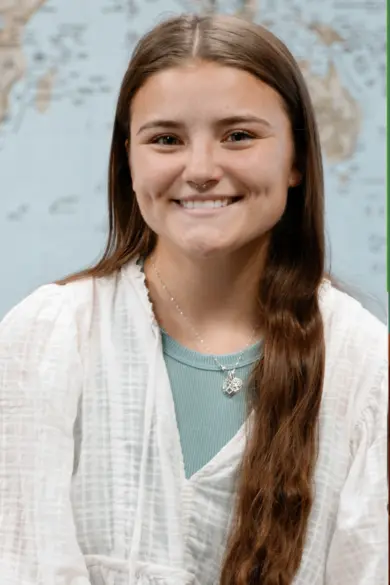

“Being a French studies major really helped me while I was abroad in France because I used the formal French skills I had been learning in the classroom. I was able to use what I’ve learned to understand the day-to-day French culture.”
— Catherine Chodnicki ’25
“Susquehanna’s annual events have been significant to my time here at Susquehanna. They host Thanksgiving dinner. President Green reads us Christmas stories. Events like those truly make it feel like a community. I also feel very connected to my professors, the staff and the student body in general.”
— Isabela Proger ’27
Language Fellows
As part of the Fulbright Foreign Student Program, the Fulbright FLTA Program is designed to develop Americans’ knowledge of foreign cultures and languages by supporting teaching assistantships in more than 35 languages at hundreds of U.S. institutions of higher education.
The FLTA program offers educators from more than 55 countries the opportunity to develop their professional skills and gain first-hand knowledge of the United States, its culture and its people.

Meet the Faculty
TAKE A VIRTUAL TOUR
Launch ExperienceYOU MAY ALSO BE INTERESTED IN
See the full list of related programs on the School of Humanities page.
Have Questions?
Contact Us
Start your journey.




